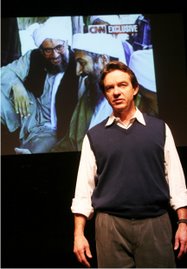Covers the ideas behind impeachment again, eloquently, going briefly into Nixon's offenses. We learn that Europeans have testified that torture is useless; Fein asks why then do B&C employ it. (Hubris, anyone?)
Torture doesn't have a definition ala geometry (paraphrasing); one example, though, we prosecuted Japanese soldiers who water-boarded American soldiers in WWII. Fein's quickest definition: "If you thought you would read about it in The Gulag Archipelago... [it's torture]." Nice.
Criminal intent must be present so as to prevent vagueness (the torturer must know what he/she's doing).
Extraordinary rendition - we send "bad guys" to countries that don't mind torture so much, such as Egypt. One big problem, Fein points out, is that this is a secret process; government transparency is lost; executive can act without consultation, without openness. ("The informing" power/process of Congress.)
According to Fein, if you know what is going to happen when you release a prisoner into the care of a sovereign who uses torture, than you yourself are guilty of torture according to U.S. law. Why, asks Fein, do we outsource any justice to other countries? Why don't we take command of our own justice system, top to bottom?
You can't, Fein points out, torture to save lives, just because someone may know something about, let's say, a bomb. We have to accept that bombs will go off; we will find bombers; we will not torture them, jail them sans habeas corpus.
[Applause.]
(Para:) The legal rationale [to Bush's expanded powers] is the rationale of a monarch, of a Hammurabi, who can change his mind at any time.
(Para:) You cannot have a president making claims to powers such as the right to torture, for any reason. You cannot have Bush issuing signing statements that say "yes, but... [I reserve the right to do whatever I want]."
Subscribe to:
Post Comments (Atom)




No comments:
Post a Comment